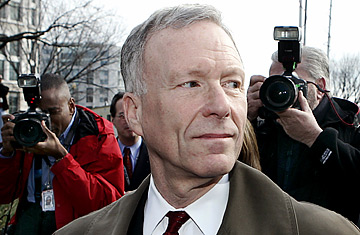
Lewis "Scooter" Libby, U.S. Vice President Dick Cheney's former chief of staff, leaves a federal court in Washington, D.C., in 2006.
Throughout the trial, Prosecutor Patrick Fitzgerald kept coming back to Hardball. Libby seemed a singularly obsessive viewer of the show. His exacting attention to how host Chris Matthews characterized the role of the Vice President in sending Wilson to Niger undermined the defense's case that Libby had too much on his mind to have really bothered to lie — or even to have remembered what exactly to lie about. They argued Libby had other preoccupations; the war, possible al-Qaeda attacks, the 27 national security topics and 13 terrorist threats that were in Libby's briefing book on the day a CIA briefer testified that he told Libby about Joe Wilson's wife.
All of those issues may have been on his mind, Fitzgerald argued, but Libby still had time to obsess about what Chris Matthews was saying about him on Hardball — and time to call Tim Russert and complain about it. Fitzgerald had notes and witnesses to prove that Libby, for a least a few minutes a day, stopped thinking about "the next 9/11" and instead counted the number of times Matthews questioned why "the Vice President" had sent former ambassador Joe Wilson to look for evidence of Iraq's interest in WMDs. It was Fitzgerald's job in court to stress Libby's role as a senior commandant in what TIME speculated was a Bush White House "war on Wilson."
But Libby's defense wasn't wrong. Libby was consumed by the war on terror. The courtroom record strongly indicates, though, that he viewed his media monitoring and attacking of critics as a natural extension of that war on terror.
The drama in a D.C. courtroom demonstrated the extent to which political "talking points" aren't just messages, but rather the very currency of government. The Libby trial contained examples of the Vice President's office trading talking points with reporters in exchange for access (TIME reporter Matt Cooper got an "exclusive," while in the same bargain Libby got his message in the magazine), and soliciting talking points from the President's office. Cheney himself demanded that the White House spokesman tell "key press" that Libby was as innocent of the charge of leaking classified information as Karl Rove (whose innocence the White House had attested to on record). Cheney wrote, "Not going to protect one staffer [Rove] and sacrifice the guy that was asked to stick his neck in the meat grinder [Libby]."
Wilson went to Niger to look for evidence of Iraq's interest in WMDs. Faced with the hard truth that neither Wilson nor the U.N. could prove that interest, the White House had no ammunition to rebut the charge that the Administration "lied our country into war." The White House, and the Vice President's office in particular, had to offer an alternate "message" instead: Wilson was sent by his wife.
So at the moment the White House was assiduously touting the imminence of a massive terror threat in Iraq, they also appear to have mobilized much of its senior staff in a campaign essentially to tar Joe Wilson as a wimp. And in that is the sobering message beyond the Libby trial's legal minutiae: The same wise men who were assessing a phantom threat to America's domestic peace were the same people taking minute note of their own PR. Perhaps the larger moral here is that had Washington torn itself away from the petty melodramas such as who dissed whom on Hardball — or in the pages of TIME — perhaps there would have been more scrutiny of the intelligence that led the nation into Iraq in the first place.
